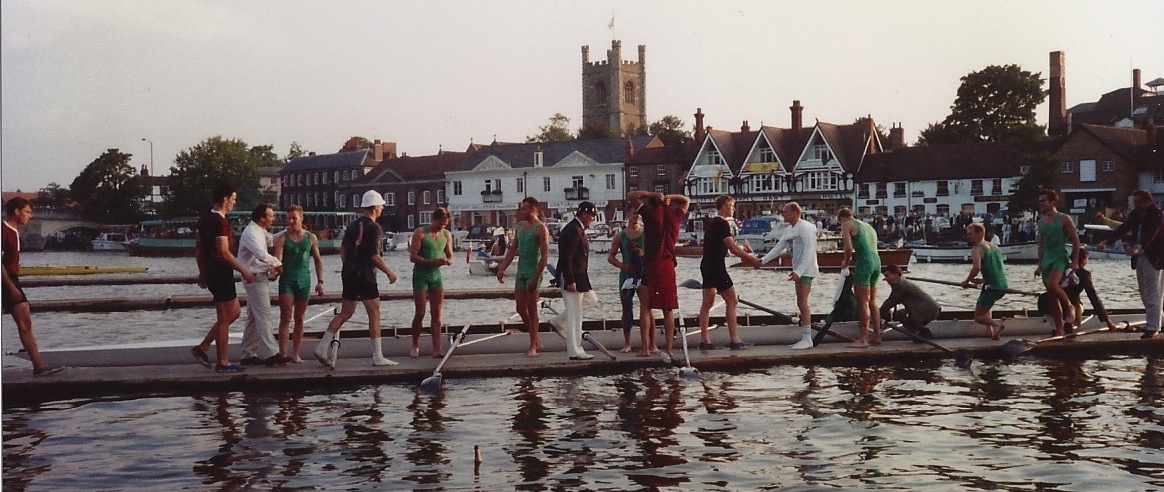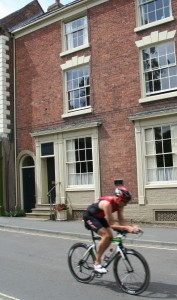William Penny Brookes was born, lived, worked and eventually died at 7 Wilmore Street in the tranquil Shropshire market town of Much Wenlock. It is surprising how a man who spent so much of his life in such a small, if beautiful, patch of rural England played such a major part in the creation of the modern Olympic Movement.
Born on 13 August 1809, Brookes followed his father into the medical profession training in London, Padua and Paris. On his father’s death in 1831, he returned to Much Wenlock to take over the practice and become a leading figure in the local community.
In 1841, Brookes established the town’s Agricultural Reading Society as an early lending library. This gave birth to a number of ‘classes’ promoting the arts and sciences. Convinced of the importance of physical exercise Brookes set up the Wenlock Olympian Class in 1850 under the umbrella of the Reading Society with the objective of holding an annual games to “promote the moral, physical and intellectual improvement of the inhabitants of the town and neighbourhood of Wenlock, and especially the working classes.”
Including a mix of classic athletic events and traditional country sports, the first games were held in October 1850. Open to all-comers, the second Games in 1851 were already attracting competitors from Wolverhampton and Birmingham.
When Evangelis Zappas staged the Athens Olympian Games – restricted to Greek nationals – for the first time in 1859, a £10 donation from Brookes on behalf of the Wenlock Olympian Committee resulted in the Wenlcok Prize being awarded for the ‘Sevenfold’ race.
By 1860, the Olympian Class flew its nest in the Agricultural Reading Society to become the Wenlock Olympian Society that exists to this day. It was also in this year that Brookes launched a new initiative: the Shropshire Olympian Games. Conceived as a biannual event, the staging of the Shropshire Games would be taken on by a different town within the county every two years – a model later adopted by the Olympics.
In 1865, Brookes extended his horizons further when, in collaboration with John Hulley of Liverpool and Ernst Ravenstein of the German Gymnasium in London, he was instrumental in establishing the National Olympic Association. This “union for different Olympian, Athletic, Gymnastic, Boating, Swimming, Cricket and other similar societies” staged its first festival at Crystal Palace over three days in 1866. (The fourth National Olympian Games were held in Much Wenlock in 1874.)
The success of the event, which attracted 10,000 spectators, promoted the formation of the Amateur Athletic Club by a group of ex-public school athletes determined to preserve sport for ‘amateurs and gentlemen’. Despite the efforts of the AAC, which later became the Amateur Athletic Association, athletics remained open to what Brookes described as ‘every grade of man’.
A sustained campaign to see physical education included in the school curriculum led to the first contact, in 1889, between Brookes and Baron Pierre de Coubertin, founder of the International Congress on Physical Education. At Brookes’ invitation de Coubertin arrived by train to attend the Much Wenlock Games on Linden Field on 22 October 1890. That evening, he was guest of honour at a dinner hosted by the Wenlock Olympian Society at the Raven Hotel in Barrow Street. It was during this visit that Brookes shared his dream of reviving an international Olympic Games in Athens – an idea that de Coubertin acknowledged in an article in La Review Athletique on his return to France.
Unfortunately, Brookes died at home in Wilmore Street on 10 December 1885 just four months before his dream was realised with the staging of the 1896 Olympic Games in Athens. In an obituary for Brookes, de Coubertin wrote:
“If the Olympic Games that Modern Greece has not yet been able to revive still survives today, it is due, not to a Greek, but to Dr William Penny Brooks.”
Brookes is buried just across the road from his home in the churchyard of Holy Trinity Church. On visiting the grave in 1994, Juan Antonio Saramanch, the then President of the International Olympic Committee, Samaranch said,
“I came to pay tribute and homage to Dr Brookes who really was the founder of the Modern Olympic Games.”
Much Wenlock’s Museum and Visitor Information Centre on the corner of High Street and Wilmore Street displays a collection of documents and artefacts associated with Brookes and the Much Wenlock Olympian Games. It is also the starting point for the Oympian Trial which takes visitors to all the major landmarks linked to the town’s Olympic connection.
Visit Britain has produced this video on Penny Brookes and Much Wenlock.




